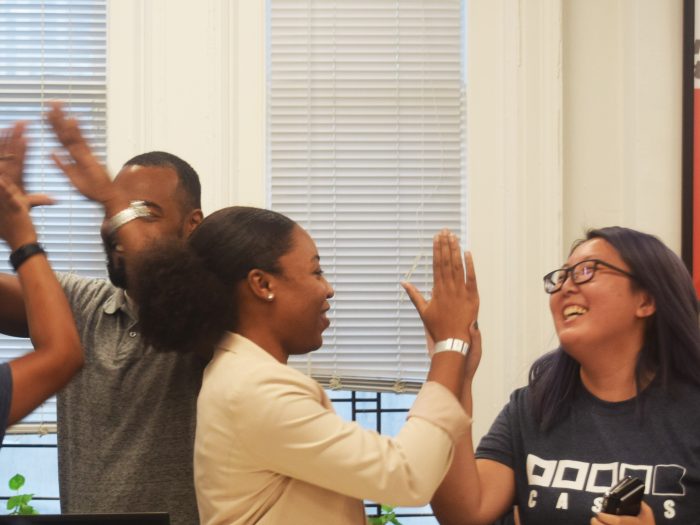
This fall, CASES continues our tradition of providing clinical training for graduate interns to work with some of New York City’s most vulnerable communities. Our class of more than forty interns join us in our efforts to provide meaningful alternatives to bail and incarceration, educational assistance, employment readiness, youth prevention programs, and reentry services.
Our internship program is critical to our mission of helping those who are involved with the criminal justice system because it allows us to train emerging professionals to work closely with individuals who have serious mental illness, those who are experiencing chronic homelessness, and youth who have long been disconnected from school and employment. Because CASES addresses complex needs, our field instructors administer regular clinical supervision to ensure interns are receiving the best practical training to complement their graduate studies. This year’s class, mostly social work students, comes from a variety of graduate programs in the area, including Hunter College, New York University, Columbia University, Fordham University, Alfred University, Stony Brook, Teacher’s College (Columbia University), and The John Jay College of Criminal Justice.
“Interns have invaluable learning experiences at CASES and we are rewarded when an intern becomes an employee,” said LeAnn Sharpe, Senior Director of Court Services. “Our commitment to clinical learning continues post graduation. As an approved provider of continuing education for social workers and licensed mental health counselors, CASES offers trainings for staff to hone and advance their professional practice.”
Elaisha, a social worker for CASES’ Brooklyn Intensive Mobile Team (IMT), began her time at CASES as an intern in 2017. While completing her last year of a graduate program in social work at New York University, Elaisha worked on a multidisciplinary team designed to sustain engagement for individuals with behavioral health needs, unsafe and escalating behaviors, and a history of transient and complex cross-system involvement. Though she feels she wasn’t using many of the clinical skills she was being taught in her program, she appreciated that her supervisor bridged the gap between theory and practice at CASES by infusing clinical methods into her supervision and team meetings.
When she was hired as fulltime social worker with the agency in 2018, Elaisha went from seeing two participants, to having a caseload of six. As a staff member, she had to learn to reestablish her authority with participants she initially worked with as an intern.
“I learned a lot about rebuilding boundaries,” she said.
Elaisa is grateful to have started her career at CASES because working in IMT’s innovative and unique engagement model has given her professional experiences that she would not have otherwise had in her first year as a social worker.
JoAnn, a seasoned psychiatric nurse practitioner, agrees. She finds working with IMT rewarding because it gives interns multiple viewpoints. If a participant is having a crisis, for example, JoAnn focuses on their medical concerns whereas the IMT team leader—a licensed, clinical social worker—attends to the participant’s behavioral needs..
Interning at CASES also affords emerging social service professionals the opportunity to engage with multiple areas of social work. For example, though Rachel initially interned with CASES’ Pathways to Education Achievement and Knowledge (PEAK) afterschool center for Family Court youth on probation in the Bronx, she is currently a fulltime Court Liaison Specialist with CASES’ Manhattan court staff.
It was as an intern with CASES youth services that Rachel gained her first clinical experiences screening participants. She now screens adults daily in her work identifying potential participants for CASES programs in arraignments in the courts.
“I liked working with PEAK because I got to see social work in a lot of different areas all at once,” she says. Still, while she thought she would want to work with youth once she finished her graduate program, she’s found that working in the courts is a better fit for her at the moment.
Rachel finds it difficult to identify the most challenging part about her current role at CASES because she feels that everyone is supportive.
“Arraignments can be chaotic,” she says, “but my supervisor is always available. Even if it’s a short meeting while we’re walking to another courtroom or if I call her with a question I have.”

